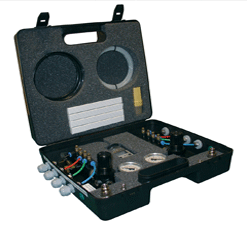Breathing air supply needs to be tested regularly to confirm it meets required quality standards
Without efficient air treatment compressor oils, pipe scale and airborne contaminates drawn in by the compressor intake can, when mixed with moisture, become a destructive cocktail that will ruin processes and plant and cause premature wear in any equipment with which it comes into contact. Breathing air testing ensures these contaminants are not passed on to your employees and production processes.
Airpower UK have years of experience with breathing air systems and our highly trained engineers can offer advice and solutions for all breathing air applications.
COSHH regulations require a minimum interval of three months between tests of breathing air systems, while BS EN12021 stipulates minimum quality standards for breathable compressed air, covering levels of oxygen, carbon monoxide, carbon dioxide, lubricants, water, other types of contaminants and odour. COSHH states:
‘As an employer, there is a clear responsibility under the requirements of the HSE to provide fit for purpose safety equipment for all employees that may work in an environment or carry out a process which may be hazardous to the employee’s health. Should an employer fail to provide and maintain this equipment, they will be liable for any damages claimed by an affected employee.’
Pre-planned air quality testing is a cost effective, hassle free solution to comply with this legislation. Please contact our team on 01480 217904 to find out more or you can email us.
See the BCAS breathing air factsheet here
BS EN12021 – Compressed Air Breathing Quality
What is BS EN12021?
In compliance with the BS EN12021 it is required that any compressed air used for breathing equipment must not contain any contaminants at a harmful level that will have a damaging effect, in order to keep in compliance regular tests must be carried out. However, it is to be noted that not every substance needs to be tested; a risk assessment should be carried out to decide which substances must be tested for.
The tests for harmful substances should be carried out at least once every 3 months unless the piece of equipment is to be moved or can be seen to be contaminated; then another test should be carried out.
The results of the tests must be recorded and documented this is so that it can be certified that all of the requirements have been met.
Why test breathing air to BS EN12021 standards?
It is imperative that breathing air is tested often and thoroughly for contaminants in compressed breathing air, excessive levels of CO, CO2, oil and mist can cause the user to become lightheaded, nauseous and dizzy.
High levels of contaminants can be caused by saturated filters or incorrect compressor servicing; these factors would not necessarily be picked up in the initial stages of servicing, adding emphasis to the importance of compressed air testing. It’s difficult to detect CO or CO2 as, until they’re at a harmful level, they don’t give off any taste or odour. In addition to potential health risks, contaminated air can also create problems such as inefficient filtration which in the long run can lead to unnecessary costs.
The standards provided by BS EN12021 are, as such, the only UK standards available to follow. The European standard for the quality of compressed air states that “in any event all contaminants shall be kept to as low a level as possible and shall be below the national exposure limit.
The guidelines provided by the BS EN12021 are summarised below;
- Oxygen – 21% + / – 1%
- Carbon Monoxide – Low as possible not exceeding 15 mlm3
- Carbon Dioxide – Cannot exceed 500ml/m3
- Oil mist / vapour – Cannot exceed 0,5mg/m3
- Odour / taste – Without significant odour or taste
- Water (liquid) – Without significant odour or taste
- Water (vapour) – Air for compressed air line breathing apparatus shall have a dew point sufficiently low to prevent condensation and freezing.
- Where apparatus is used and stored at a known temperature, the pressure dew point shall be at least 5°C below the likely lowest temperature.
- Where conditions of usage and storage of the air is not known, the pressure dew point shall not exceed -11°C.
To help you carry out the regular tests, as required by the BS EN12021, a1-cbiss have designed a conveniently packaged breathing air quality test kit that comes with everything required for an ‘on the spot’ test. At 4kg and packaged in an aluminium casing, the AIRQUAL-1 is rugged, lightweight and does not require charging, meaning that it can even be used in situations where power isn’t accessible.
Go back to safety and compliance section


